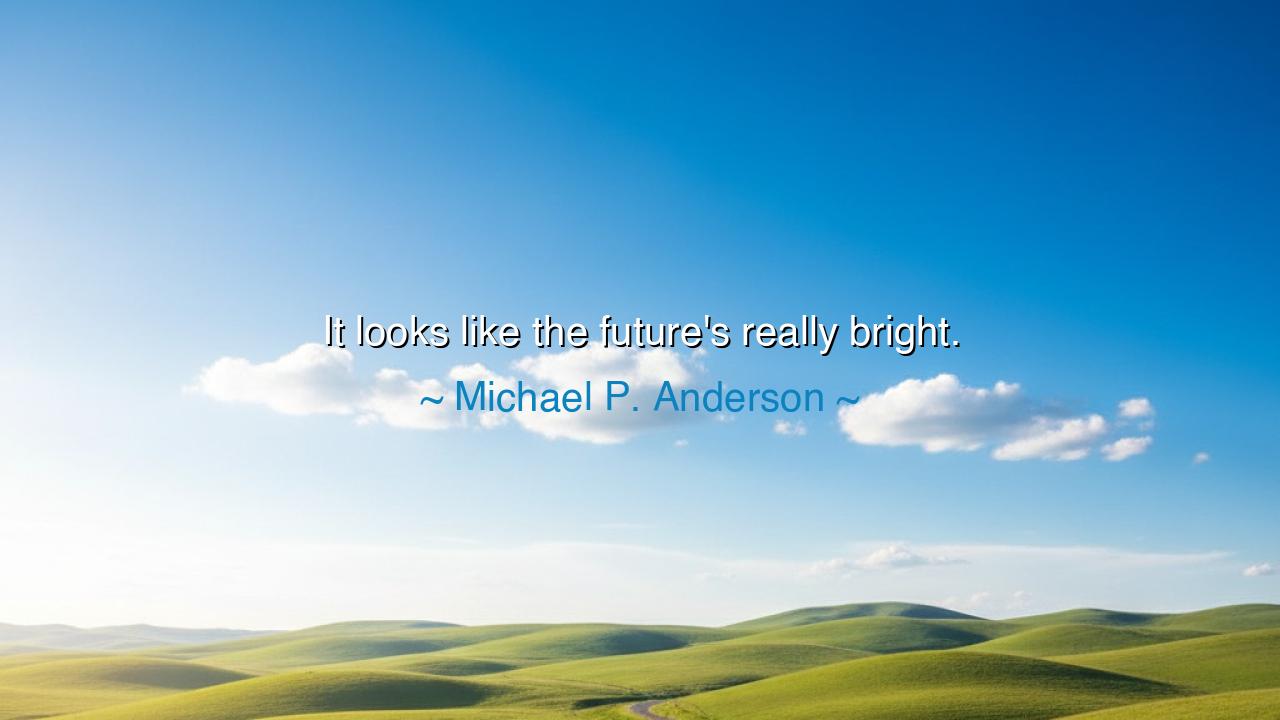
It looks like the future's really bright.






"It looks like the future's really bright." These words, spoken by Michael P. Anderson, capture a sense of hope and optimism in the face of uncertainty. In the vastness of life, where the future is often cloaked in shadows of doubt and fear, Anderson’s statement is a call to embrace the potential of what is yet to come. The brightness he speaks of is not simply the promise of a world free from struggle, but the unseen possibilities, the opportunities for growth, change, and transformation that lie ahead. It is a reminder that despite the challenges we face today, there is always the possibility of a brighter tomorrow, and it is within our power to shape it.
In the ancient world, the concept of the future was often intertwined with the divine and the unknown. The Greeks, with their reverence for fate and destiny, believed that the future was something that could not be entirely controlled but could be influenced by how one lived in the present. The oracle of Delphi famously told those who sought knowledge of the future, "Know thyself." This aphorism speaks to the idea that, while we cannot always foresee what lies ahead, self-awareness and wisdom can guide us to a future filled with promise and potential. The Greeks understood that even in the face of the unknown, one could act with courage and virtue, creating the conditions for a future that was not dark and uncertain, but bright with possibility.
Similarly, the Romans looked to the future with a sense of duty and hope. Cicero, the great Roman philosopher, believed that virtue and wisdom were the keys to shaping the future. He argued that it was through thoughtful action and a life led by moral principles that one could ensure that the future would unfold in a way that was beneficial, not just for the individual, but for society as a whole. In his view, the future was something to be earned, and those who lived with purpose and integrity were the ones who could look ahead and see a future that was not only bright but just and prosperous for all.
In the same way, Anderson’s words are an expression of the belief that the future is not simply a matter of chance or fate, but of the choices we make today. His statement reminds us that the brightness of the future is a reflection of our efforts in the present. Consider the story of Nelson Mandela, who, despite decades of imprisonment and adversity, never lost sight of his belief in a bright future for South Africa. His vision was rooted in hope, and despite the seemingly insurmountable challenges of apartheid, he believed that a better, brighter world was possible if the people remained committed to justice, equality, and peace. Mandela’s life is a testament to the fact that the future, while unpredictable, is shaped by vision and action.
The bright future that Anderson speaks of is not just a passive hope, but a dynamic force that requires effort and commitment. In modern times, we can look to individuals like Malala Yousafzai, whose voice for education and women’s rights has sparked a global movement. Malala’s life shows us that, even in the face of violence and oppression, the future remains bright for those who dare to speak the truth and fight for what is right. Malala’s future was shaped by her determination to create change, and her work continues to inspire millions around the world to believe in the bright future that can be built with courage and conviction.
The lesson we take from Anderson’s words is profound: the future is not something that simply happens to us; it is something we actively create. Our choices, our actions, and our vision for the world shape the path ahead. Just as the ancients believed that virtue, wisdom, and purposeful action were the keys to a good life, so too must we take responsibility for the future we wish to see. It is not enough to wait for the future to come—it is our duty to prepare for it, to act with integrity, and to approach it with hope.
In your own life, ask yourself: what future are you creating? Are you living with purpose, making choices that will contribute to a bright future, not just for yourself, but for others as well? The brightness of the future is not a matter of luck or destiny, but of the actions we take today. Embrace the possibilities of tomorrow by living with intentionality, hope, and vision. Just as Mandela, Malala, and countless others have shown, the future is not something to fear, but something to shape. Let your actions today be the foundation for a brighter, more just, and compassionate future for all.






AAdministratorAdministrator
Welcome, honored guests. Please leave a comment, we will respond soon